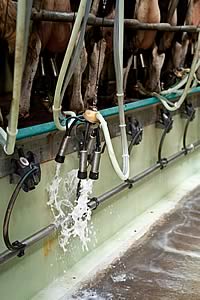 |
|||||||||
|
|||||||||||||||||||
|
|
National Cluster Hygiene Study Published at Agriscot Dairymen across the country need to make the most of the considerable mastitis control potential offered by routine milking cluster disinfection to reduce bacterial cross infection between cows, according to the first-ever National Cluster Hygiene Study published at Agriscot.
Undertaken by The Dairy Group in association with Agriscot biosecurity sponsor, BASF Pest Control Solutions, the Sorgene study involved structured consultant interviews with a representative sample of 100 dairy farmers across the country over the past summer and early autumn. “Our study shows the overwhelming majority of producers (96%) see high standards of cluster hygiene as an essential part of modern mastitis control,” reports Dairy Group senior dairy husbandry consultant, Dr Brian Pocknee who co-ordinated the study. “So much so that fully 80% are now routinely disinfecting clusters at milking in some way. “While there’s a good understanding of how important the practice can be in controlling contagious mastitis, the value of routine cluster disinfection in environmental mastitis control appears to be noticeably less well appreciated. Yet we know Streptococcus uberis can be spread from cow to cow, so cluster hygiene should also be important in keeping it at bay. “The results further underline the need for a much greater appreciation of the mastitis-spreading risk of cows with high Somatic Cell Counts,” he stresses. “Around three quarters of herds always disinfect their main clusters and dump units after milking cows with clinical mastitis. Despite the fact that high SCC cows can have more bacteria in their milk than those showing clinical mastitis, though, just 45% always disinfect clusters after milking cows with high SCCs and around 30% never do.” Cluster dipping remains the most widely used disinfection system, according to the Sorgene study. Almost half the herds employ the practice compared to just over two in 10 using automatic back-flushing and one in 10 cluster spraying. Automatic systems have, however, seen a dramatic increase in popularity in recent years. “The vast majority of producers (82%) regard reduced mastitis cross-infection as the most important benefit of the routine cluster disinfection, with a similar proportion (85%) regarding a good disinfectant as vital,” notes Dr Pocknee. “While 70% are using a Sorgene 5-type peracetic acid/hydrogen peroxide disinfectant, however, around 20% continue to use chemicals like sodium hypochlorite that require relatively long contact times to be effective. And a significant minority are only using water. Here again, better understanding would really improve cluster hygiene in practice - in particular, the importance of following well-researched manufacturers’ recommendations for dilution, contact time and pre-treatment rinsing.” Time appears to be the real stumbling block to improvement here, with two thirds of producers identifying the time required as the biggest drawback of routine cluster disinfection. In practice, however, around two thirds find the technique extends their milking time by less than five minutes and nearly 40% – including many without the luxury of automatic back-flushing – see no additional time implications whatsoever. This indicates time problems may be more perception than reality in many cases. “Nearly a third of producers involved in our study feel even the most time-consuming technique of cluster dipping has a wider practicality than just following the milking of mastitic or high SCC cows,” Dr Pocknee explains. “Which clearly suggests many consider the benefits significantly outweigh any drawbacks. “Good cluster hygiene is recognised as important by the vast majority of dairymen these days,” he concludes. “The key challenge is to ensure the best practice that will really minimise bacterial cross-infection via the teat cup liners in ways which can be accommodated within the milking routine and facilities. At the same time, of course, everyone needs to appreciate that routine cluster disinfection is only one part of good milking and mastitis management.” BASF Pest Control Solutions has used the results of the study to produce a special Advice Note on making the most of routine milking cluster disinfection. Copies are available free of charge to UK dairymen from the technical team at 0161 485 6222 or pestinfo@basf.com.
|
||||||||||||||||||

|
|
||||||||||||||||||
| home | agri-services | pedigree
pen | news | dairy | beef | machinery BPS | property | organisations | site map |
|||||||||||||||||||


